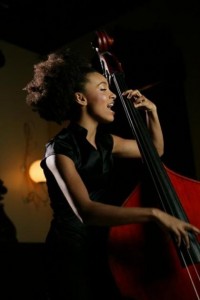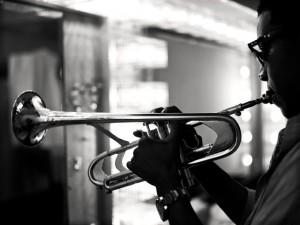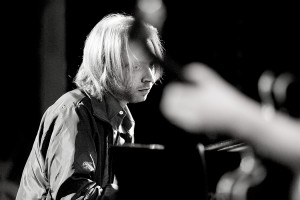While this is not a new idea, it is one that jazz music and musicians are struggling with. In fact, cultural relevance might be the central issue for jazz in the 21st century.
Jazz in the Present Tense
A few months ago I went to see the movie Icons Among Us: Jazz in the Present Tense. It was showing at Northwest Film Forum as part of the Earshot Jazz Festival. Im still processing all the thoughts it brought up, but one of the most interesting and important points in the film was made by writer Paul DeBarros (a Seattle guy):
If you look back at what we now consider a golden age in the music, the '50s and '60s, you think of more than music. You think of integration, the civil rights movement, you think of a kind of bohemian outsiderism. The problem jazz faces right now is that if you say jazz to somebody they don't have something obvious in the present culture they can connect it with. What is it actually saying? [It needs] something obvious in the present culture they can connect it with.
As jazz musicians, this is a central issue that we have to struggle with. Without getting into the tired rhetoric of the jazz wars, I do think its imperative that we try to connect our music to our own culture, our own experience of the world, our own lives. This is what makes the music of the '50s and '60s so powerful, that it was speaking directly to the issues of the day. But when we play that music now, however skillfully we may play it, isn't it still referencing a bygone era? Its the reason Miles Davis stopped playing the music that made him famous. Its the reason Coltrane experimented with different song forms and extended group improvisations. And it's the reason that cats like Dave Holland, Esperanza Spalding, Christian Scott aTunde Adjuah and Aaron Parks are trying to fuse the music of our time with various jazz aesthetics.
Editors Note
Let me state for the record here that I am not saying we shouldn't play standards and/or play in the language of bebop or post-bop. These forms still have their place. In fact, a significant portion of my income is derived from playing this way. What I'm talking about here is the need to connect art with the current culture in order to be relevant and grow the audience for jazz. While playing standards does serve a legitimate purpose, it is probably not what will help the music appeal to more and more people.
Music as Cultural Identity
The great bassist Dave Holland recently spent a week teaching at the Birmingham Conservetoire in England, and the whole thing was documented by the students with video cameras. There's a wealth of great stuff for the jazz junkie here! But one of the most interesting videos, and one that speaks to the topic at hand, is this one where Dave speaks about music as cultural identity, and does so from his own experience playing music that is so closely linked to someone else's culture rather than his own.
One of the things that gave the music, and still gives the music, great power is the cultural identity that the music represents. Its not just an entertainment. It's not just about, you know, putting on a show. Its about expressing who you are, and who you are as a culture, and as a race, or as a people.
Here's the whole thing:
Dave Holland on music as cultural identity from Andrew Dubber on Vimeo.
Idol Worship
There is a nice profile of bassist Esperanza Spalding in the latest edition of The New Yorker. The interviewer talked to her just after she spent a week playing with legendary pianist McCoy Tyner. While Spalding says she really enjoyed the week, it also
...reaffirmed my understanding of the music that the most important artist and the most important time is, like, right now. It's the people who are learning now, and creating new things right now. Idol worship doesn't help this music in any way.
She is definitely blazing her own trail in so many ways, being a female singing bassist in a male-dominated instrumental world!
Have a Vision
I just read this interview with the young trumpeter Christian Scott in which he gets into some of these same ideas. I applaud Christian for trying to speak to his times and his way of dealing with the world around him. But it's not like he's disregarding what came before him. Rather, he is using the ideas he's learned from the jazz musicians that preceded him, not the music itself.
I've had the experience of being around a lot of older musicians. I learned all these different styles and all the old guys said amen to what you're doing, if you have a vision. So I've never bought into this is what it is, and if it's not that, then it's wrong, because most of the older musicians don't feel like that, they just create. I'm not buying into trying to please people, worrying they won't like my music.
Christian is a prefect example of a young cat who has studied the music diligently and intently, and taken the spirit of it to heart. He's not interested in rehashing the styles of the past, but in using the same aesthetic that produced such powerful, of-its-time music, to make music of this time.
Here's a cool YouTube video I just found of Christian talking about some records that inspired him. He speaks exactly to what I'm talking about above:
Making the Music of Now
Parks (another Seattle guy) expresses similar views in this interview with Seattle jazz radio station KPLU:
I think there's something happening nowadays where that door that's been opened for us [covering rock and other forms of music], were starting to like really walk through it all the way and unapologetically. You know, were not really here's a lot of people who are not concerned with what the jazz traditionalists think anymore. Because the fact of the matter, from my perspective -- I really love classic jazz, I love it so much. But that was music that was so of its time, so tied to its time, it could only be made in that time. Trying to make that music now, it doesn't reflect the experience of somebody living now. And so what the people, you know, a lot of my generation, were making the music of now. Were not trying -- were not caring about whether you call it jazz or whatever. We love jazz, but we don't care about what the definition is.
Parks is not playing music that is contrived to be something different than what came before him. He is simply making music that reflects his world, the way he sees it and interacts with it. He's doing exactly what his heroes did. Armstrong, Ellington, Parker, Mingus, Coleman, Hancockthey laid the groundwork for us. It's up to us to use the lessons they taught us, not necessarily the music they left us, to forge our own path and tell our own story.
The Revolution Will be Internet-ized
Luckily, this is happening all over. As Parks said, there's a whole generation (or two) that is telling its own story. The four I mention here are but a small sampling of the musicians, young and old, who are trying to find out just how the jazz music of today correlates with the culture of today. And there are folks on the web spreading the gospel, like the good folks at AllAboutJazz.com, Nextbop.com and Barry Dallman, just to name a couple. I'm glad that my contemporaries, be they jazz musicians, writers or just plain fans, are acknowledging this shift in the music and attempting to alert the world that this is not their parents jazz. It's vital, it's relevant, and it's a whole lot of fun!
So tell your own story in whatever language you choose. This is how we will make music of our time, and connect it to our culture.





























